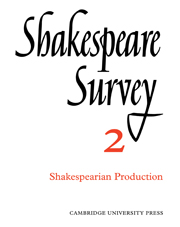Book contents
- Frontmatter
- Fifty Years of Shakespearian Production: 1898–1948
- An Original Drawing of the Globe Theatre
- The Projected Amphitheatre
- Ben Jonson and Julius Caesar
- The Booke of Sir Thomas More and its Problems
- The ‘Shakespearian’ Additions in The Booke of Sir Thomas More
- The Renaissance Background of Measure for Measure
- The Individualization of Shakespeare’s Characters through Imagery
- Trend of Shakespeare Scholarship
- Shakespeare in France: 1900–1948
- International News
- Shakespeare in New York: 1947–1948
- The Year's Contributions to Shakespearian Study 1 Critical Studies
- 2 Shakespeare’s Life and Times
- 3 Textual Studies
- Books Received
- Index
- Plate section
Trend of Shakespeare Scholarship
Published online by Cambridge University Press: 28 March 2007
- Frontmatter
- Fifty Years of Shakespearian Production: 1898–1948
- An Original Drawing of the Globe Theatre
- The Projected Amphitheatre
- Ben Jonson and Julius Caesar
- The Booke of Sir Thomas More and its Problems
- The ‘Shakespearian’ Additions in The Booke of Sir Thomas More
- The Renaissance Background of Measure for Measure
- The Individualization of Shakespeare’s Characters through Imagery
- Trend of Shakespeare Scholarship
- Shakespeare in France: 1900–1948
- International News
- Shakespeare in New York: 1947–1948
- The Year's Contributions to Shakespearian Study 1 Critical Studies
- 2 Shakespeare’s Life and Times
- 3 Textual Studies
- Books Received
- Index
- Plate section
Summary
In the year 1636 René Descartes published his Discourse on Method, and thereby succeeded in dividing the new world from the old.
Shakespeare lived in a Pre-Cartesian world, that is, a world which had in it little uncertainty as to the nature of things and little idea as to the importance of research. Descartes began with universal doubt, and it is the presence of doubt that chiefly distinguishes our world from that of Shakespeare. Descartes discarded tradition (doubted its truth), and he and his followers have subjected all moral, religious, and intellectual ideas and beliefs to scientific investigation. Modern science has, however, made only a partial conquest of the world, partly because many people have continued to accept tradition and authority, and, partly, because there seem to be some regions into which science cannot enter or can enter only in an unconvincing way. Nevertheless there is no doubt that the scientific method and attitude have deeply affected all the life of the mind. The Pre-Cartesian world is thus in some measure a lost world to modern learned culture. Fragments of it, even large fragments, are continually being found by scholars, but they seem usually to remain fragments. The spirit and temper, the essence, of that world before the age of reason and science apparently make themselves known only to a few wise, patient and imaginative scholars and critics. The difficult quest for the spirit of Shakespeare and his age goes on, but with varying success, and most intellectuals are perhaps the dupes of literature as well as of science. Clearly, if we are to escape into the Pre-Cartesian world, we must not, although we carry our present with us, make over that past into the likeness of our present. We are tempted to do this very thing by the circumstance that human nature, although affected and no doubt in some measure controlled by the characteristics and consequential ideas of each particular time, is proverbially always the same.
When, however, we behold our shortcomings as Post-Cartesians, we cannot justly declare war against ourselves, for it must be admitted that the age of science rediscovered Shakespeare and has been busy for generations in making his greatness manifest.
- Type
- Chapter
- Information
- Shakespeare Survey , pp. 107 - 114Publisher: Cambridge University PressPrint publication year: 1949



